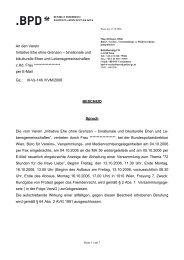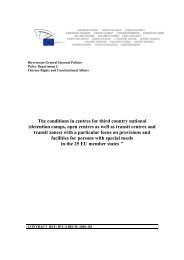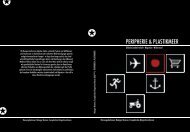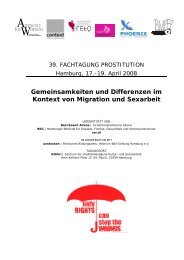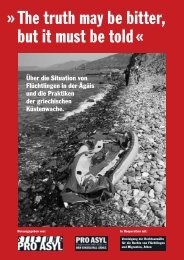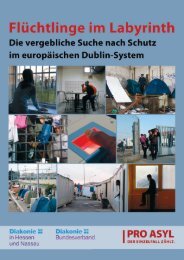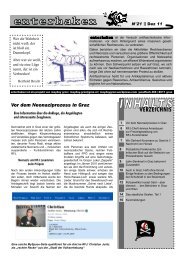Turin's CIE - International University College of Turin
Turin's CIE - International University College of Turin
Turin's CIE - International University College of Turin
You also want an ePaper? Increase the reach of your titles
YUMPU automatically turns print PDFs into web optimized ePapers that Google loves.
<strong>International</strong> Law<br />
4. COMMUNICATION WITH THE OUTSIDE WORLD<br />
Articles 9(3) and 9(4) CRC note the positive obligations that State Parties have in relation to<br />
communication between detained parents and their children:<br />
“9(3) States Parties shall respect the right <strong>of</strong> the child who is separated from one or both<br />
parents to maintain personal relations and direct contact with both parents on a regular<br />
basis, except if it is contrary to the child's best interests.<br />
9(4) Where such separation results from any action initiated by a State Party, such as<br />
the detention, imprisonment, exile, deportation or death (including death arising from<br />
any cause while the person is in the custody <strong>of</strong> the State) <strong>of</strong> one or both parents or <strong>of</strong> the<br />
child, that State Party shall, upon request, provide the parents, the child or, if<br />
appropriate, another member <strong>of</strong> the family with the essential information concerning<br />
the whereabouts <strong>of</strong> the absent member(s) <strong>of</strong> the family unless the provision <strong>of</strong> the<br />
information would be detrimental to the well-being <strong>of</strong> the child […].”<br />
Council <strong>of</strong> Europe<br />
The European Committee for the Prevention <strong>of</strong> Torture and Inhuman or Degrading Treatment<br />
or Punishment’s CPT Standards establish numerous guidelines for immigration detention<br />
centres in Europe in relation to the Article 3 ECHR prohibition on inhumane and degrading<br />
treatment. In terms <strong>of</strong> communication with the outside world, parts IV(31) and IV(79) state:<br />
Italian Law<br />
“IV(C)(31) […] More generally, immigration detainees should be entitled to maintain<br />
contact with the outside world during their detention, and in particular to have access to a<br />
telephone and to receive visits from relatives and representatives <strong>of</strong> relevant<br />
organisations.”<br />
“IV(79) Conditions <strong>of</strong> detention for irregular migrants should reflect the nature <strong>of</strong> their<br />
deprivation <strong>of</strong> liberty, with limited restrictions in place and a varied regime <strong>of</strong> activities.<br />
For example, detained irregular migrants should have every opportunity to remain in<br />
meaningful contact with the outside world (including frequent opportunities to make<br />
telephone calls and receive visits) and should be restricted in their freedom <strong>of</strong><br />
movement within the detention facility as little as possible. […]”<br />
Decreto Legislativo 286/1998 39 (Legislative Decree 286/1998), article 14.2 states:<br />
“14.2 The foreigner is detained in the centre, in a way that guarantees the necessary<br />
assistance and full respect <strong>of</strong> his own dignity. Freedom <strong>of</strong> correspondence and<br />
telephone communications are guaranteed as well. Beside what is stated under article<br />
39 Decreto Legislativo 25 luglio 1998, n. 286 “Testo unico delle disposizioni concernenti la disciplina<br />
dell'immigrazione e norme sulla condizione dello straniero” (GU n. 191 del 18-8-1998 - Supplemento<br />
Ordinario n. 139) (“Testo Unico Immigrazione”). Legislative Decree 25 July 1998, n. 286 “Unified text on<br />
provisions concerning immigration and norms on the condition <strong>of</strong> foreign citizens” (GU n. 191 <strong>of</strong> 18-8-1998 –<br />
Ordinary Supplement n. 139) (“Unified Text on Immigration”).<br />
25 | P a g e




